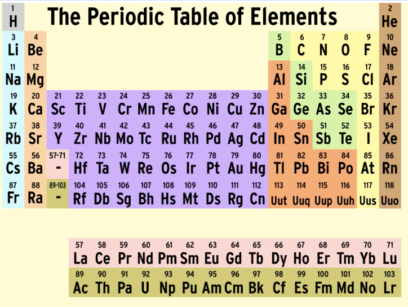Periodic Table of Elements Lesson Plan: Matter and its Interactions
*Click to open and customize your own copy of the Periodic Table of Elements Lesson Plan.
This lesson accompanies the BrainPOP topic Periodic Table of Elements, and supports the standard of using the periodic table as a model to predict the relative properties of elements. Students demonstrate understanding through a variety of projects.
Step 1: ACTIVATE PRIOR KNOWLEDGE
Display an image of the periodic table of elements, like this one:
Ask students: What is the periodic table? What does it tell you about an element?
Step 2: BUILD KNOWLEDGE
- Read the description on the Periodic Table of Elements topic page.
- Play the Movie, pausing to check for understanding.
- Have students read one of the following Related Reading articles: “Language” or “Famous Faces.” Partner them with someone who read a different article to share what they learned with each other.
Step 3: APPLY and ASSESS
Students take the Periodic Table of Elements Challenge and Quiz, applying essential literacy skills while demonstrating what they learned about this topic.
Step 4: EXTEND and DEEPEN
Students express what they learned about the periodic table while practicing essential literacy skills with one or more of the following activities. Differentiate by assigning ones that meet individual student needs.
- Make-a-Movie: Produce a movie about the periodic table that answers this question: What can you discern about an element based on its place in the periodic table?
- Make-a-Map: Create a concept map identifying and describing ways that the periodic table characterizes elements.
- Creative Coding: Code a museum exhibit highlighting the properties of an atom of a specific element.
More to Explore
Sortify: Elements of the Periodic Table: Sort elements by attributes, such as symbol and group, and order by atomic mass and valence electrons.
Teacher Support Resources:
- Pause Point Overview: Video tutorial showing how Pause Points actively engage students to stop, think, and express ideas.
- Learning Activities Modifications: Strategies to meet ELL and other instructional and student needs.
- Learning Activities Support: Resources for best practices using BrainPOP.












